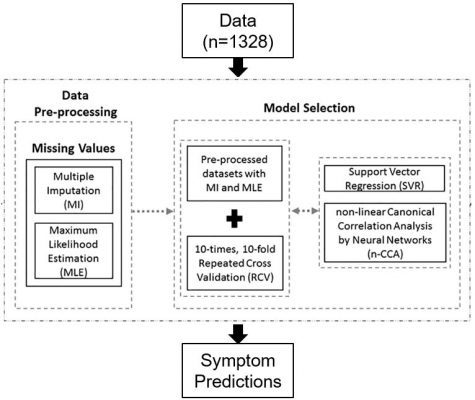Researchers have developed a new artificial intelligence that could give doctors a head start in treating cancer patients. The AI can predict symptoms throughout the course of a patient’s treatment. It can also predict the severity of symptoms.
The letters AI stand for Artificial Intelligence. AI refers to software technologies that make devices, computers, and robots think like humans. It also makes them behave like us.
The international team of researchers wrote about their work in the journal PLO One (citation below).
The authors are from the Universities of Surrey, California, Yale, Strathclyde, Pittsburgh, Peloponnese, Athens, the European Cancer Patient Coalition, the Mount Sinai Medical Center, and the UCD School of Nursing, Midwifery and Health Systems.
They explained how they created two machine learning models. The models can accurately predict the severity of anxiety, depression, and sleep disturbance that cancer patients undergoing treatment may face. The three symptoms can severely reduce the quality of life of cancer patients.
The team gathered and analyzed existing data of the symptoms that cancer patients face during computed tomography x-ray treatment.
They used different periods during this data to determine whether the machine learning algorithms could accurately predict when and if symptoms emerged.

AI’s predictions close to what cancer patients experienced
The results showed that the symptoms cancer patients reported were very close to those that the machine learning methods had predicted.
Co-author, Payam Barnaghi, a Professor of Machine Intelligence at the University of Surrey, said:
“These exciting results show that there is an opportunity for machine learning techniques to make a real difference in the lives of people living with cancer. They can help clinicians identify high-risk patients, help and support their symptom experience and pre-emptively plan a way to manage those symptoms and improve quality of life.”
AI’s positive impact on cancer patients
Co-author, Nikos Papachristou, a PhD student at Surrey University who worked on this project’s machine learning algorithm, said:
“I am very excited to see how machine learning and AI can be used to create solutions that have a positive impact on the quality of life and well-being of patients.”
Co-author, Professor Adrian Hilton, Director of Surrey University’s Centre for Vision, Speech and Signal Processing (CVSSP), said:
“These exciting developments by Professor Barnaghi and his team show the incredible potential of machine learning in transforming the way healthcare professionals treat people suffering from cancer. We continue to explore the boundless potential of AI at CVSSP and we believe our work has a real place in helping to shape the future of health services across the globe.”
Citation
“Learning from data to predict future symptoms of oncology patients,” Nikolaos Papachristou , Daniel Puschmann, Payam Barnaghi, Bruce Cooper, Xiao Hu, Roma Maguire, Kathi Apostolidis, Yvette P. Conley, Marilyn Hammer, Stylianos Katsaragakis, Kord M. Kober, Jon D. Levine, Lisa McCann, Elisabeth Patiraki, Eileen P. Furlong, Patricia A. Fox, Steven M. Paul, Emma Ream, Fay Wright, Christine Miaskowski. PLOS ONE, Published: December 31, 2018. DOI: https://doi.org/10.1371/journal.pone.0208808.

